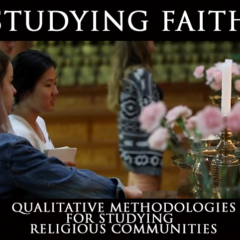Unless you have been assigned to study a particular group, your choices of which groups to study are nearly endless. If the purpose of your research study is to collect qualitative socio-cultural data involving religious practices or institutions, the key will be to identify informants who will explain to you what they think you need to know about their religious practice.
Among your pool of interviewees, you should strive to find key informants: those individuals who have an in-depth understanding of the group being studied and who are reflective and articulate about what’s going on within the particular group. These individuals are likely to be church leaders or temple abbots, administrators and other people who hold key positions or roles in the religious community. They will be also helpful in pointing you toward other individuals in the group whom you should speak with for your research.
Sometimes the best informants might be those who could be considered deviant members of a group. They can provide a perspective that others in the group do not offer.
Don’t simply choose to interview the first people you meet; instead, take time to observe and see what your options are before choosing informants. In the meantime, note the different roles people take in the group, its demographic composition, and the kinds of activities and programs that the group engages in. When selecting whom to interview, try to capture the demographic diversity of the group that you are studying, paying particular attention to age, gender, ethnicity, language and class.
Nalika Gajaweera was a senior research analyst with the USC Center for Religion and Civic Culture through 2023.
Andrew Johnson is a contributing fellow with the USC Center for Religion and Civic Culture.

